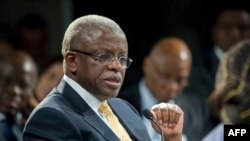Former Ugandan Prime Minister Amama Mbabazi said he’s running as an independent candidate for Uganda’s 2016 presidential election because the ruling National Resistance Movement (NRM), of which he has been a member for almost 30 years, has made it untenable for him to run as its flag bearer.
Mbabazi, who first said he was seeking the NRM nomination, denies he was rejected. Rather, he said the party changed the rules in violation of its own constitution once he expressed his desire to seek the NRM nomination.
Mbabazi said the NRM denied him the nomination because the party knows he has what he calls both silent and loud supporters within the NRM.
“As I announced some time ago, it became untenable for me to try and contest within my party. Everything was done to make it impossible for me to, and I had no choice therefore but to run as an independent,” he said.
Mbabazi said contrary to NRM regulations, heavy fees were imposed to make it impossible for him to seek the party’s nomination.
He said he did not join the opposition or form his own political party because he still believes in the core values upon which the NRM was founded. But he said that while President Museveni, who has led the party for the last 30 years, has been a good leader, he has steered the NRM away from its original goals.
“I have stated very clearly that stick to the core values of our struggle, the very principles upon which were founded the National Resistance Movement and my contention is that the leadership of the party right now has veered off course. I do represent the original NRM,” Mbabazi said.
Mbabazi said it’s time for a peaceful transition in Uganda because the country has never had a peaceful transition in its history.
Kizza Besigye, who is seeking the nomination of the opposition Forum for Democratic Change (FDC), has said there should be no election in 2016 unless there are meaningful reforms to the political system that can engender a free and fair election.
Besigye, who contested three consecutive presidential elections in 2001, 2006, and 2011, said all three were marked by voting irregularities.
Mbabazi said he has always been an advocate for electoral reform in Uganda. However, he said the problem has not been about the laws but rather the government and the institutions managing the process have been violating the laws.
“I have spoken in favor of electoral reforms. I was the chair of a cabinet committee on constitutional reform. However, I think the problem is not the laws; the problem is acting in breach of the laws because at the moment the problem we are facing is that the government and institutions handling many of these matters actually do not act in accordance with the law,” Mbabazi said.
Mbabazi said if Ugandans can come together and agree on a minimum political program, he sees no reason why they should not form a government of national unity government to lead the country.
“My line is that Uganda has such huge challenges and so we obviously need to combine our efforts to pull Uganda out of the major problems it faces today. And I think if we can agree on basic principles and can form a minimum political program, I see no reason whatsoever why we should not join hands and form a government of national unity to lead Uganda,” Mbabazi said.





